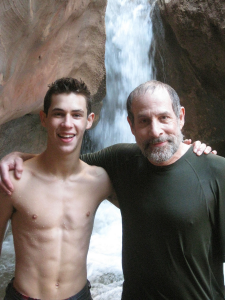Writer Interview: Daniel Asa Rose on Leaving Behind True Stories and Larry’s Kidney Optioned for Film
When Daniel Asa Rose blew onto the scene at Western Connecticut State University the summer I began my MFA in writing there, I was simultaneously unsurprised and mystified. Fellow students had talked about him as this energetic, moment-by-moment free flyer, and that’s exactly who he was. But still, from the plaid Bermuda shorts to the iconic straw hat, he had a way about him that completely set him apart from other writers there. How lucky was I to be assigned as one of his mentees, a professional-writer-in-training whose work would be coached and prodded by him.
Daniel saw me through four years as a graduate student and the making of my first published book, Tough Love: A Wyoming Childhood. He showed me that conflict in writing isn’t necessarily all about exterior, outward problems; conflict can be just as scintillating when the narrator wrestles with herself. Daniel showed me how to grow from a shy, timid, tame writer into a writer with flare and boldness. He helped me learn how to own my words and own my stories.
Take it from someone who knows: Daniel Asa Rose is an author who rocks the world of creative nonfiction storytelling.

Daniel Asa Rose with his son, rafting down the Grand Canyon. Photo courtesy of Daniel Asa Rose.
1) Where (in what state) do you write?
My home bases are New York City and a little farming town in Massachusetts. But I also write from the road : China, New Mexico, wherever. I travel a few times a year, usually for a month at a time.
2) Do you find that place – your geographic surroundings – influence your writing?
They do only in retrospect. I love writing about past places I’ve found myself in, but rarely so with the current places.
During the last four years of writing my New Mexico memoir, for example, I wouldn’t let myself return to New Mexico. The same was true with China, as I was writing Larry’s Kidney. If I did go back, it would puncture the mythical places I had so painstakingly created in my mind. In a sense, I would see how “ordinary” the place was, as every place is. But I always need to nurture the sense that the particular place about which I’m writing is unique in the world, a mysterious fount of treasures.
Now that the New Mexico memoir is done, I feel it’s safe at last for me to go back there and enjoy the place for what it is. The New Mexico of my imagination is secure.
3) Describe your writing space. How did it come into being, and why is it significant?
My writing space exists primarily in my head. In New York, I write in the middle of Manhattan, with a big window view of the Empire State Building. In Massachusetts, my writing space overlooks a meadow and pond. But the mental work, regardless of where I am physically, is internal. My presence is focused inward.
4) When do you do your writing?
I write any time and all the time. Typically, the first few hours of my day are useless except for the making of coffee and phone calls. I just have to get through them. Slowly, it picks up until by mid-afternoon, I’m cooking.
5) Where do you find inspiration for what you write?
I find inspiration everywhere. Yesterday, I was at a hardware store, and the cashier spoke over the intercom: “Wendy, two is not enough. Wendy, two is definitely not enough!” It was a perfect haiku, readymade.
6) Why do you write?
I write to keep from suffocating. I would just feel everything is pointless unless I could leave an account of myself and my progress through life. If I didn’t write, I would feel claustrophobic and panicky.
7) What are you working on right now? How did the project come to you, and why is it important?
I am finishing a memoir set in New Mexico. The project has been my life for five years. I cannot get to the next thing until I finish the current thing.
8) Your book, Larry’s Kidney: Being the True Story of How I Found Myself in China with my Black Sheep Cousin and His Mail-Order Bride, Skirting the Law to Get Him a Transplant — and Save His Life, was recently optioned for film. Can you briefly talk about the success of the book, and where the film project currently stands? 
Working on Larry’s Kidney was the most fun of my life. It just wrote itself in a fury of 6-to-8 months. And for a while, it seemed the film would go the same way. But it’s hit the usual road blocks: financing, scheduling problems, etc. Zack Galifianakis and Will Ferrell are still in to play my cousin and me, and Richard Linklater is still the director. But it may be a while before it all comes to pass. Keep the faith!
9) What is one of the most important lessons you have learned through the writing process?
I’ve learned that there are a million ways to do it right. I’ve learned not to be paralyzed waiting for the perfect words, but to set down the words that present themselves and move on.
10) How do you balance time to write with other facets of life that demand attention?
I balance time by feeling constant pressure and stress. Breathing helps, when I remember to do it consciously.
11) Who is your favorite author? Why? How were you first exposed to this writer?
I’ve had so many favorite authors. A huge influence on me was Faulkner. I studied Faulkner in an ordinary college course my sophomore year. I remember walking to my dorm after class in the twilight, and everything seemed touched with mystery and purpose.
12) Who have been some of your biggest influences?
Goodness, there are so many ! Faulkner, Orwell, John Lennon , my mother , the Russians …..
To learn more about Daniel Asa Rose and his work, visit www.danielasarose.com.



